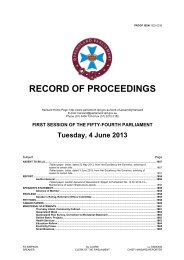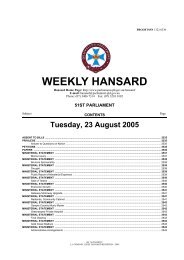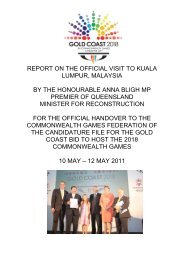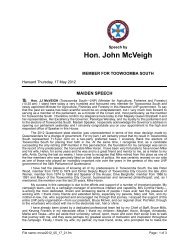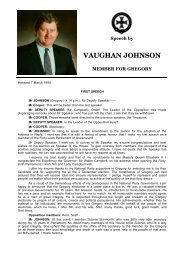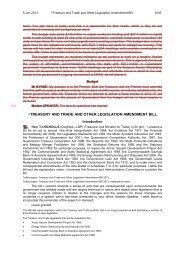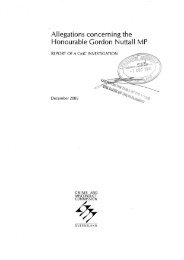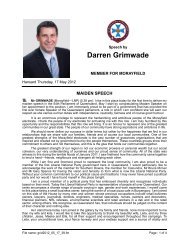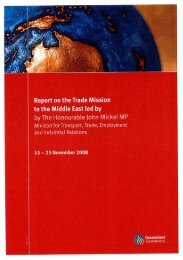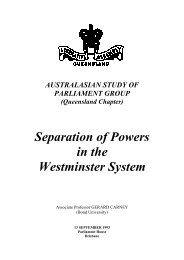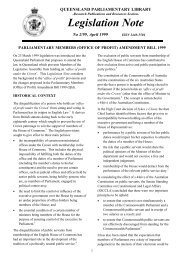RECORD OF PROCEEDINGS - Queensland Parliament ...
RECORD OF PROCEEDINGS - Queensland Parliament ...
RECORD OF PROCEEDINGS - Queensland Parliament ...
Create successful ePaper yourself
Turn your PDF publications into a flip-book with our unique Google optimized e-Paper software.
2310 Appropriation (<strong>Parliament</strong>) Bill; Appropriation Bill 31 Oct 2012<br />
has the potential to greatly distort the <strong>Queensland</strong> economy away from the most efficient market<br />
allocation. In refusing to answer this question, the minister refused to rule out a return to the agrarian<br />
socialist tradition of the old National Party, which has always been a feature of <strong>Queensland</strong> conservative<br />
parties.<br />
In an answer to a question taken on notice during the hearing, the minister was forced to reveal<br />
that the Newman government’s massive job cuts will directly affect front-line service delivery in the<br />
Department of Agriculture, Fisheries and Forestry. Under the current definition of a front-line employee,<br />
some 55 front-line staff have been fired. Even this does not show the full extent of these job cuts as the<br />
Newman government, in their zeal to fire as many public servants as possible, has fiddled with the<br />
definition of ‘front-line’. According to the definition used by the previous government, some 180 front-line<br />
positions will disappear from the department.<br />
Mr GIBSON (Gympie—LNP) (8.35 pm): I rise to make a contribution to this debate with regard to<br />
the examination by the Agriculture, Resources and Environment Committee of the expenditure of the<br />
Department of Agriculture, Fisheries and Forestry, the Department of Natural Resources and Mines and<br />
the Department of Environment and Heritage Protection. At the outset I give thanks to the three<br />
ministers who were involved for their professionalism and that of their directors-general and<br />
departmental staff who made themselves available to the committee. In all cases we found that they<br />
held themselves to an incredibly high standard and we thank them for that.<br />
I also put on record our thanks to the committee chair, the member for Lockyer, for doing a<br />
wonderful job. I also thank the new committee members who were involved—the new members from all<br />
sides of parliament. Whilst obviously there were some games being played, overall there was a desire<br />
to do what the estimates process was designed to do, and that is to examine the expenditure of<br />
government.<br />
At this time I make the point—and we have heard much from the Labor Party—that their<br />
ignorance of parliamentary procedure is nothing short of outstanding. They fail to recognise that it is the<br />
parliament’s role to hold the executive to account, and the parliament does that—both government and<br />
non-government members. It is appropriate for the non-government members to have over 50 per cent<br />
of the time, but it is also a requirement for the parliament—both government and non-government<br />
members—to hold the executive to account. The failure of the Labor Party to grasp that simple concept<br />
of the Westminster system highlights their ignorance of how parliamentary procedure works. That is<br />
evident in the way in which they have run this state as we now see the challenges.<br />
The examination of the various departments that we had the opportunity to undertake was<br />
comprehensive. The estimates process that we have now—the new design of portfolio based<br />
committees that sit throughout the whole year and come to examine at the time of estimates—has<br />
shown that there is a greater consolidation of corporate knowledge and we are able to utilise that, both<br />
government and non-government members, in examining expenditure. I do not intend to go through the<br />
various portfolio areas and their expenditure. That is outlined in the report as are the highlights of those<br />
various areas.<br />
I do wish to touch on a couple of areas that are pertinent to my electorate. I know that the people<br />
of Gympie have been particularly excited by the Newman government’s commitment to agriculture and<br />
tourism because they have a major impact on our area. Agriculture is an area in which my electorate<br />
has had a strong involvement. The commitment to doubling agricultural production is one that we<br />
recognise can occur. The history of Gympie is that in the past it was a mining area. We were very<br />
pleased to hear the Minister for Natural Resources and Mines and his departmental officers give a<br />
comprehensive review of the mine-capping program. Whilst no active mining is occurring in the area,<br />
from time to time as mine shafts collapse we find there is a need for the capping program to continue. It<br />
has been in place for a long time. Certainly the work that is carried out in that area is valued by all<br />
members of my community.<br />
Finally, I wish to touch upon the portfolio of Environment and Heritage Protection. Gympie has a<br />
great interest in both areas of this portfolio. In terms of heritage protection, we continue to preserve<br />
those buildings from the gold rush in the mid to late 1800s—a gold rush that saved the state of<br />
<strong>Queensland</strong>. My electorate also has a great affinity with the environment. We remember the days when<br />
Labor tried to destroy the Mary Valley and embarked on a process of environmental vandalism and<br />
ignoring the science. We commend the minister for his science based approach. Unlike what we saw<br />
with ideology from those opposite, we now have a minister who understands the importance of making<br />
policy decisions based on science. That is the way we need to move forward every time.<br />
I again thank all members of the committee. I thank our chair because without his guidance we<br />
would not have been able to go through the portfolios that we did in the time that was allocated to us.<br />
Mr KNUTH (Dalrymple—KAP) (8.40 pm): The foundation of the 2012 budget was the<br />
Commission of Audit conducted by former Treasurer Peter Costello which recommended to immediately<br />
reduce the size of the Public Service and cut government expenditure. The audit also recommended a<br />
continued privatisation and asset sale agenda. The Appropriation Bill 2012 endeavours to follow two of



